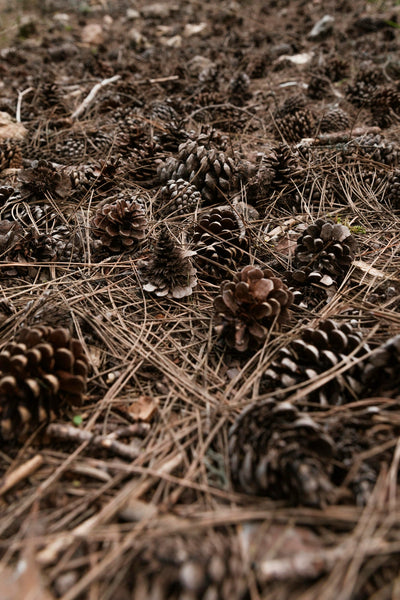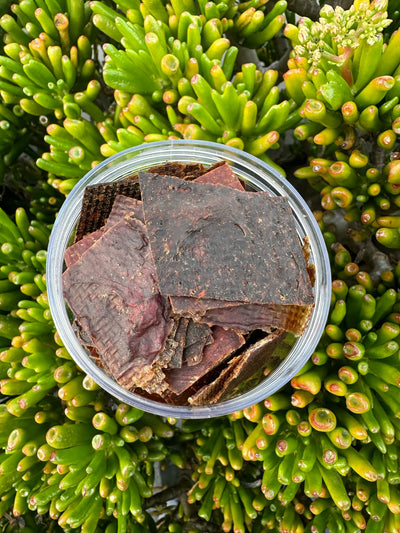As dog owners, we all want to ensure that our furry friends lead healthy, happy lives. But did you know that weed pollens can be a significant source of allergies in dogs? If your dog has been showing signs of discomfort, like excessive scratching or redness on the skin, it could be due to weed pollen allergies. In this blog post, we'll dive into how specific weed pollens, such as Dandelion and Fat Hen, can affect your dog's health and what you can do to manage these allergies. Plus, we'll share insights from Xigua’s allergy test and how Bags to Bones dog treats can play a crucial role in your dog’s overall well-being.
Understanding Weed Pollen Allergies in Dogs
Weed pollen allergies are common in dogs, especially during certain seasons when pollen counts are high. Just like humans, dogs can develop allergic reactions to pollen, leading to a range of symptoms that can be uncomfortable and sometimes even painful.
What Are Weed Pollen Allergies?
Weed pollen allergies occur when your dog’s immune system overreacts to pollen particles released by weeds. These tiny particles can easily be inhaled or come into contact with your dog’s skin, triggering an allergic response.
Common Symptoms of Weed Pollen Allergies in Dogs
- Itching and Scratching: The most noticeable symptom is excessive scratching, often focused on specific areas like the ears, paws, or belly.
- Redness and Inflammation: You might notice red, inflamed patches on your dog's skin, particularly in areas where they’ve been scratching.
- Sneezing and Runny Eyes: Just like in humans, dogs can experience sneezing, a runny nose, and watery eyes due to pollen exposure.
- Hair Loss: In severe cases, continuous scratching can lead to hair loss in affected areas.
Insights from Xigua’s Allergy Test: Dandelion and Fat Hen
Our beloved French Bulldog, Xigua, recently underwent an allergy test that revealed she was allergic to specific weed pollens, including Dandelion and Fat Hen. Understanding these allergens has helped us take better care of her and manage her symptoms effectively.
Dandelion Pollen: A Hidden Culprit
Dandelion pollen is a common allergen that can affect dogs who spend time outdoors, especially in areas where dandelions are prevalent. The tiny pollen particles can easily become airborne, making it difficult to avoid exposure. Xigua experienced itching and redness, which we initially couldn’t pinpoint until her allergy test revealed the culprit.
Fat Hen: More Than Just a Weed
Fat Hen, another common weed, produces pollen that can trigger allergic reactions in sensitive dogs. For Xigua, exposure to Fat Hen pollen led to sneezing and watery eyes, which we now manage by limiting her time outside during peak pollen seasons.
Managing Weed Pollen Allergies in Dogs
Now that we know which pollens affect Xigua, we’ve implemented several strategies to minimize her exposure and alleviate her symptoms.
Reduce Outdoor Exposure
Limit your dog’s outdoor activities during peak pollen seasons. Early mornings and late evenings are typically the best times to take your dog out, as pollen counts are lower.
Regular Baths and Grooming
Bathing your dog regularly helps remove pollen particles from their coat. Using hypoallergenic shampoos can further reduce the risk of allergic reactions.
Clean Living Spaces
Keep your home as pollen-free as possible by regularly vacuuming and using air purifiers. This can help reduce the amount of pollen your dog is exposed to indoors.
Diet and Nutrition
A healthy diet plays a vital role in managing allergies. At Bags to Bones, we believe that natural, high-quality dog treats can support your dog’s immune system and overall health.
Q&A Section
Q: How can I tell if my dog is allergic to weed pollens like Dandelion or Fat Hen?
A: The best way to determine if your dog is allergic to specific weed pollens is through an allergy test conducted by your veterinarian. Symptoms to watch for include itching, redness, sneezing, and watery eyes.
Q: Can I prevent my dog from being exposed to weed pollens?
A: While it’s difficult to completely avoid pollen exposure, you can minimize it by limiting outdoor activities during high pollen seasons, keeping your home clean, and regularly bathing your dog.
Q: How do Bags to Bones dog treats help with managing pollen allergies?
A: Our dog treats are made from high-quality, natural ingredients that support your dog’s immune system. A healthy immune system can better handle allergens, reducing the severity of allergic reactions. Plus, our treats are free from common allergens, making them a safe choice for dogs with sensitivities.
Why Choose Bags to Bones Dog Treats?
At Bags to Bones, we’re committed to providing your dog with the best. Our dehydrated dog treats are made from premium ingredients, ensuring your dog gets the nutrition they need without any unnecessary fillers or allergens. By incorporating Bags to Bones dog treats into your dog’s diet, you’re not only treating them to something delicious but also supporting their overall health and well-being.
Take Action Today!
If your dog suffers from pollen allergies or if you want to provide them with the best natural treats available, explore our full range of dehydrated dog treats. Your dog deserves the best, and at Bags to Bones, we’re here to provide it.
By focusing on the specific needs of your dog and taking proactive steps, you can help manage their allergies and keep them healthy and happy. For more tips on managing allergies and to explore our range of treats, visit Bags to Bones today!













